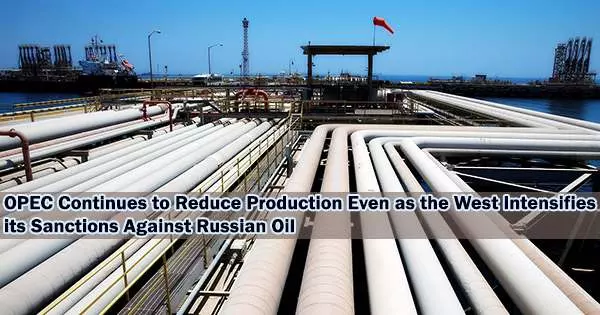Just hours before fresh Western sanctions on Russian crude shipments take effect, OPEC and its allies voted on Sunday to maintain their current strategy of limiting oil production.
The Organization of the Petroleum Exporting Countries (OPEC) and other significant oil producers, including Russia, announced they will maintain a 2 million barrels per day supply restriction that was put in place in October, began last month, and is expected to extend through the end of 2023.
In a statement, OPEC said Sunday’s meeting held via video conference had reaffirmed the decision taken in October, adding that the group was ready to meet at any time to “address market developments if necessary.”
The largest cuts since the start of the pandemic, those agreed with in October, provoked criticism from the United States. The Biden administration referred to them as “shortsighted” and claimed that by raising energy prices, they would harm low and middle-income countries.
Since then, however, oil prices have fallen as traders have concentrated on how continued coronavirus lockdowns in China and concerns about a world recession may affect demand.
Markets could be volatile in the coming days, however. Europe’s ban on importing oil from Russia shipped by sea kicks in on Monday, injecting extra uncertainty into the outlook for energy supply.
G7 nations, the European Union and Australia agreed Friday to impose a price cap of $60 a barrel on Russian oil shipped to other countries that have not adopted an embargo. The move, which also takes effect Monday, is aimed at depriving the Kremlin of revenue while avoiding a price shock by keeping Russian oil flowing to some markets.
Moscow has previously threatened to retaliate by cutting off oil supply to countries that adhere to the price cap.
Ukrainian President Volodymyr Zelensky called the decision to set the price cap at $60 a “weak position.”
“The logic is obvious: if the price limit for Russian oil is $60 instead of, for example, $30, which Poland and the Baltic countries talked about, then the Russian budget will receive about a hundred billion dollars a year,” Zelensky said in his nightly address on Saturday. “This money will go not only to the war and not only to Russia’s further sponsoring of other terrorist regimes and organizations.”
The International Energy Agency expects Russian crude production to be curtailed by some 2 million barrels of oil per day by the end of the first quarter of next year, its chief Fatih Birol told Reuters last week.















